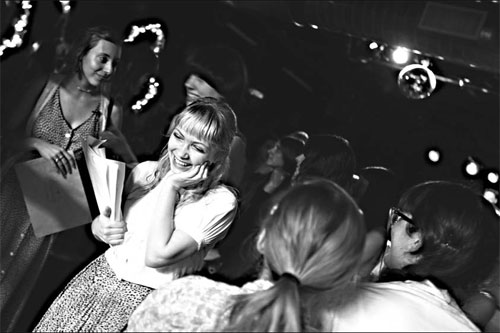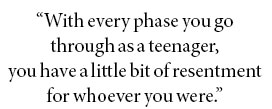
 |
|
Tavi Gevinson, a 16-year-old fashion blogger who started an online magazine last fall, on tour in Brooklyn. Emily Berl for The New York Times |
On a Monday afternoon in Brooklyn in late June, about 200 teenagers had gathered to see Tavi Gevinson, a 16-year-old fashion blogger turned online impresario.
Ms. Gevinson read an excerpt from Rookie, the online magazine that she started last fall, called "How to Bitchface." ("Step one: Look as much like you don't care as possible.")
When she stepped off the stage, girls swarmed her by the dozens.
"I've read your blog since I was 10," one said.
Ms. Gevinson seemed overwhelmed. "There are so many stylish people in the same room," she said, before a crowd of teenagers enveloped her in a group hug.
The event was the kickoff of the Rookie Road Trip, a 16-city tour across America. Rookie grew out of Ms. Gevinson's blog, The Style Rookie, which she started at the age of 11. She shared ruminations on everything from Proenza Schouler to gym class, and posted unsmiling self-portraits taken at her home, in Oak Park, Illinois.
Then, in a whirlwind, Ms. Gevinson became the darling of those she'd revered, like John Galliano, Miuccia Prada and the Mulleavy sisters. Soon she was sitting front row at fashion week, interviewing Rei Kawakubo in Tokyo and drawing praise from Lady Gaga. She even garnered backlash from old-timers, including a Grazia editor who complained at a Dior show that her bow was blocking the runway.
By the time Teen Vogue named her "the luckiest 13-year-old on the planet," in 2009, Ms. Gevinson had appeared on the cover of Pop magazine and starred in a video for Rodarte's Target line.
In late 2010, she announced a new project: a magazine inspired by Sassy, the Nirvana-era teen magazine that folded in 1996. Sassy's founding editor, Jane Pratt, nurtured the venture, and within six days of its start Rookie broke one million page views.
Like its founder, whose aesthetic runs toward alt '90s nostalgia, Rookie attracts a certain kind of admirer: precocious, indie-minded, with a D.I.Y. fashion sense.
Rookie has made ample use of Ms. Gevinson's celebrity cachet, with contributions from Sarah Silverman, a comedian, and Lena Dunham, an actress and filmmaker, and a segment called "Ask a Grown Man," which has featured Jon Hamm, Paul Rudd and Judd Apatow giving boy advice.
In the last two years, Ms. Gevinson has morphed from punky oddball into a winsome beauty with blond bangs. "With every phase you go through as a teenager, you have a little bit of resentment for whoever you were before," she said. "I would not want to dye my hair blue now, because I got so sick of it."
Tavi's parents - Steve Gevinson, a retired English teacher who now acts as her unofficial manager, and Berit Engen, who weaves Judaica-inspired tapestries - are encouraging, but neither seems overly invested in their daughter's career.
"We just want her to grow in as healthy a way as possible and make sure she's got a realm of normalcy in her world, which can be a little nutty," Mr. Gevinson said in a recent phone interview.
Despite her V.I.P. connections, Ms. Gevinson maintains an impressively normal lifestyle. She still gets romantic about the usual 10th-grade stuff, like how her 16th birthday was "the best day of my life." In a way, her rites of passage are essential to Rookie's authenticity: it's a place where teenagers can channel their own adolescence through hers.
Ms. Gevinson seems to be positioning Rookie as a kind of antidote to what girls like herself read elsewhere. In a recent interview with Racked, she criticized Seventeen magazine: "I feel like if I followed their articles about boys and truly believed it was as important to do certain things or avoid certain things as they say, I would probably go crazy. Sometimes their 'embarrassing' stories are literally about boys finding out that you have your period."
Ms. Gevinson has carved out a distinct countercultural voice, the kind that existed in full force during the bygone decades she celebrates. Whether or not Ms. Gevinson's fame outlasts her youth, the road trip's popularity was evidence enough that her message was resonating, at least for a self-selecting group.
The New York Times